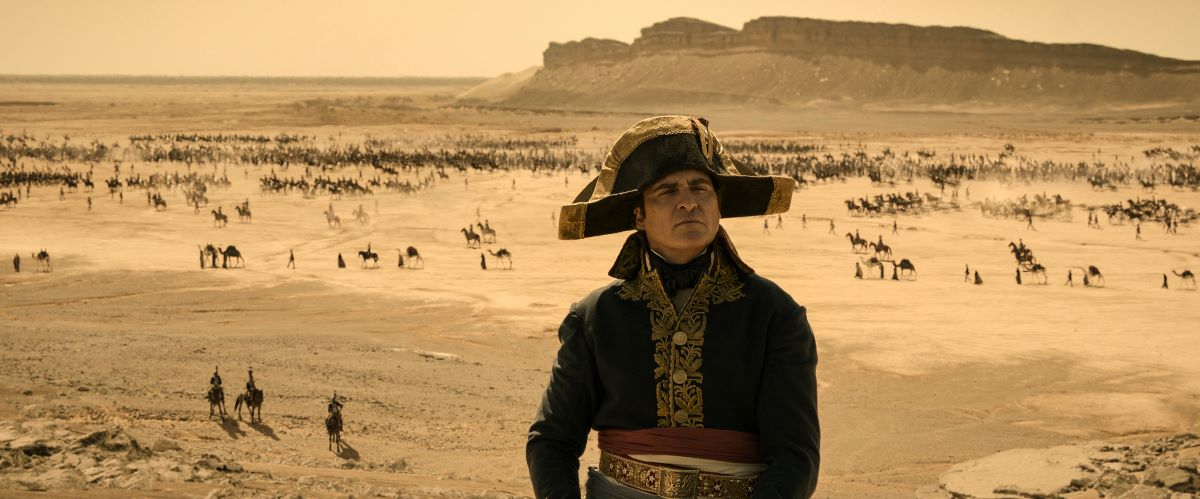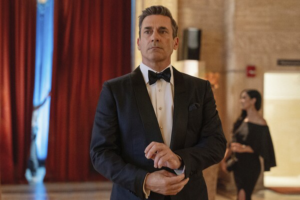DISCLAIMER: Before I delve into my review, I’d like to address a point that some historians have raised about the accuracy of certain events portrayed in the movie. For example, some have questioned the depiction of the battle at the Pyramids of Giza and Marie Antoinette’s appearance at her execution. While these critiques are worth noting, it’s essential to remember that historical movies often take creative liberties to make the story more engaging for the audience.
At the same time, if you’re genuinely interested in learning more about Napoleon, I’d encourage you to do your research and reading. While this movie is undoubtedly a unique interpretation of the subject, gathering information from multiple sources is always valuable to gain a more comprehensive understanding.
Oscar-nominated Director Ridley Scott reunites with his Gladiator star Joaquin Phoenix for Sony’s action epic Napoleon. David Scarpa has written a screenplay that delves into the fascinating life of the legendary French Emperor Napoleon Bonaparte (played by Joaquin Phoenix). The movie portrays his tumultuous journey from obscurity to power through the lens of his passionate and turbulent relationship with his one true love, Josephine (portrayed by Vanessa Kirby). The film highlights his exceptional military and political strategies, making him a visionary leader with dynamic and practical battle sequences.
The first time I can recall hearing the name Napoleon was in the comedy classic Bill and Ted’s Excellent Adventure, where Terry Camilleri humorously portrayed the character discovering life in 1989’s Golden State. While Phoenix doesn’t try to put the moves on a mature woman or discover the joys of a water park, he brings his method of acting to the role.
Phoenix is renowned for immersing himself in his characters’ psyches, researching their backgrounds, and adapting their behaviors and appearance. The real Napoleon was already 5″2 compared to Phoenix’s 5″8, so I’m curious how he prepared for the role. One of the first things viewers should know about Napoleon is that the script doesn’t do a traditional narrative that goes from birth to death. Instead, it focuses on a particular meaty aspect of the titular character’s life, allowing Phoenix and Kirby to flex their acting muscles.
Napoleon is the second most depicted character on screen, and many directors have tried to bring the iconic figure to the screen. Scott starts things off strongly with a graphic reenactment of Marie Antoinette’s beheading, showing us how Napoleon rose to power. Phoenix is all in with the role and displays a man full of bravado who knows how some view him. When he meets Vanessa Kirby’s character of Josephine with her feminine wiles, Phoenix quickly turns the character into a beta male.
There were early rumors that Vanessa Kirby might win an Oscar for her role, but her performance was not fully utilized in the film’s final version. The script depicts a toxic and co-dependent relationship between the two characters, but some of the best parts of Kirby’s portrayal were left out during the editing process. Despite this, Phoenix and Kirby deliver good performances, unintentionally evoking laughter at specific points. Vanessa Kirby was rumored to be an Oscar contender for her role, but her best work was left out of the final cut. The script depicts a toxic and co-dependent relationship, and while both Phoenix and Kirby perform well, some moments elicit laughter.
Additionally, the film is longer than it needs to be. Sitting in my press screening, numerous critics were checking their watches. I respect Scott for bringing his dream project to the screen, but perhaps this would’ve been better as a mini-series. Despite some impressive battle scenes and the usual theatrics from Phoenix, Napoleon loses the war in quality entertainment.
Final Grade: C
Napoleon opens in theaters tomorrow, November 21st.





